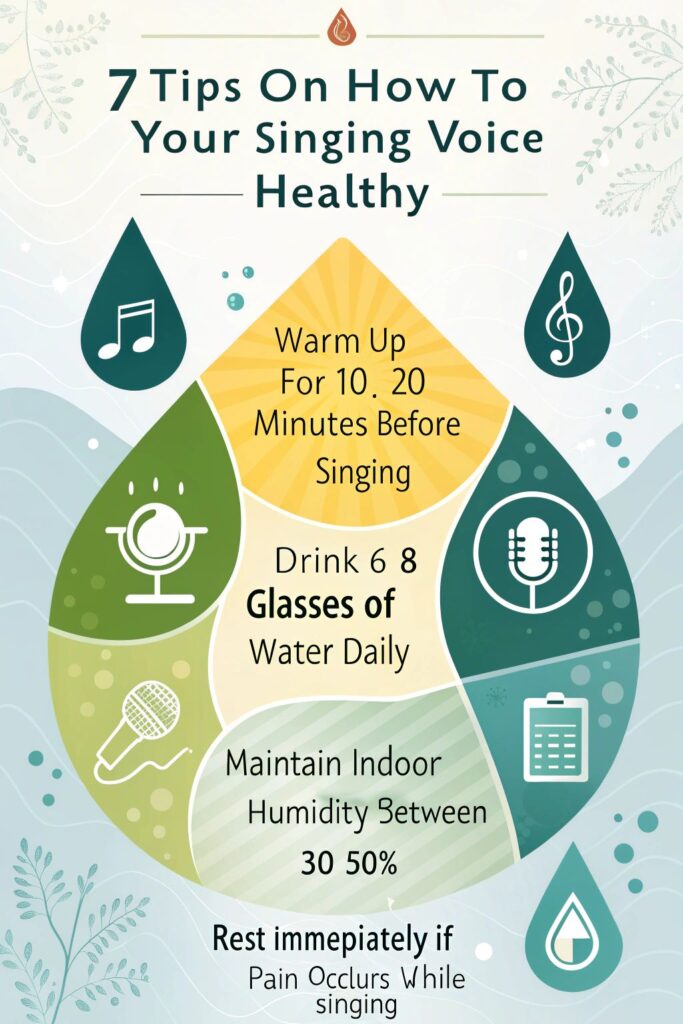
7 Tips On How To Keep Your Singing Voice Healthy
Many singers struggle to keep their voice in top shape. Vocal cords are delicate and need proper care to stay healthy. This guide shares simple, practical tips for maintaining a strong singing voice.
Key Takeaways
- Vocal health is vital for singers to deliver strong performances and prevent long-term damage. Rest, hydration, and proper technique are key.
- Allergies, smoke exposure, tension, overuse, and abuse can harm vocal cords. Avoid triggers like cigarette smoke or shouting to reduce risks.
- Warm-ups, cool-downs, and humidifiers protect the voice. Singing with proper breathing also prevents strain during practice or performance.
- Dairy should be avoided before singing as it causes mucus build-up in the throat; herbal tea (non-caffeinated) supports hydration instead.
- Recognising signs of vocal strain like hoarseness or difficulty hitting notes helps avoid severe injury by allowing time for rest and recovery.

Importance of Vocal Health

Vocal health plays a key role in a singer’s ability to perform well. Healthy vocal cords allow singers to hit the full range of notes with clarity and precision. Irritated or inflamed cords, on the other hand, can limit performance and even cause long-term damage if neglected.
Vocal wellness for singers is not optional—it determines how consistently they can deliver strong performances over time.
Caring for vocal cords also prevents strain that leads to hoarseness or pain. A small issue like dehydration can dry out the cords, impacting their flexibility and tone quality. Singers who prioritise vocal hygiene protect their voices from harm caused by overuse or harmful habits such as smoking.
For any performer, preserving one’s voice ensures longevity in any music career—something no artist should overlook!
Potential Causes of Vocal Cord Damage

Allergies
Allergies can wreak havoc on a singer’s voice. Allergic reactions often irritate the vocal cords, leading to inflammation and swelling. This can impair vocal quality and cause noticeable changes in pitch or tone.
Common allergens like dust, pollen, and mould trigger these issues. Swelling of the vocal cords affects airflow—making singing more difficult. Musicians should watch for allergy symptoms like throat tightness or increased hoarseness during performances.
Identifying allergic triggers early is key to preventing long-term damage.
Smoke
Smoke exposure harms vocal cords. Air pollution, cigarette smoke, and secondhand smoke introduce toxins into the throat. These toxins dry out and irritate the vocal cords, causing inflammation and long-term damage.
Singers exposed to environmental toxins or toxic fumes risk losing vocal strength over time.
Inhaling smoke inflames the respiratory system, leading to throat irritation. Even brief contact with smoke can cause coughing or a raspy voice. “Cigarette smoke dries out your cords faster than almost anything else,” warns many voice coaches.
Avoiding smoky environments protects both your singing ability and overall health.
Tension
Tension in the vocal cords can cause voice strain and vocal cord damage. Stress often plays a huge role, tightening muscles and increasing tension. Improper vocal technique adds to this risk, making it harder for singers to use their voices safely.
Vocal cord stress over time may lead to injury or even long-term harm. Singers should stay aware of how they feel while performing. Listening to your body helps prevent worsening issues like vocal cord strain or fatigue…
Overuse
Overuse happens when singers push their voices too much without rest. It leads to vocal fatigue and damage over time. Long hours of singing or speaking can strain the vocal cords, causing hoarseness and even long-term issues like vocal nodules or polyps.
Continuous use without breaks increases the risk of vocal injury. Many performers face problems like laryngitis or throat strain due to vocal overexertion. Signs such as a tired voice should not be ignored—rest is crucial for recovery after heavy use…
Abuse
Abuse of the voice, like constant yelling or screaming, can harm the vocal cords. This misuse creates strain and leads to inflammation, hoarseness, or even laryngitis. Over time, repeated abuse may cause more permanent issues such as vocal nodules or vocal trauma.
Small actions—like shouting during gigs or speaking loudly in noisy spaces—add up. Vocal fatigue and throat irritation are warning signs that often get ignored. As a result, long-term damage becomes harder to reverse without rest or medical help.
Seven Tips for Maintaining Vocal Health

Warm up and cool down
Vocal exercises should last 10 to 20 minutes before singing. Loosen facial muscles, lips, and jaw first. Simple throat exercises like humming or lip trills can prepare the vocal cords for performance.
After singing, cooling down is just as important. Gentle sighing on a descending note helps relax the voice. Lip trills after performing ensure proper vocal relaxation techniques are used.
Voice care starts with these steps!
Hydrate your voice
Water works best for throat lubrication and vocal cord care. Singers should drink plenty of water daily, aiming for 6–8 glasses. This keeps the voice supple and prevents irritation.
Herbal teas are also great, but they shouldn’t be too hot. Consistent hydration supports vocal hygiene and helps with vocal wellness. Dry throats strain faster—hydration is key for maintaining a healthy voice!
Humidify your home
Dry air can harm your vocal cords. Humidifiers keep the air moist, which helps maintain throat health and prevents irritation. For singers practising intensely, humidification supports respiratory health and vocal cord care.
Aim for 30-50% indoor humidity to improve air moisture.
Using a humidifier boosts indoor air quality, especially during winter when heaters dry out rooms. Properly moisturised vocal cords enhance singing performance and protect against strain.
This simple strategy improves overall vocal hygiene while supporting consistent vocal training routines.
Take vocal naps
Using a humidifier helps keep your throat moist, but rest is equally important. Vocal naps allow the vocal cords to heal and prevent damage. Talking, singing, or even whispering can strain them after heavy use.
Complete silence gives the larynx time to recover.
Singers should take breaks often—especially during long rehearsals or tours. Rest becomes vital if feeling hoarse or unwell. Ignoring vocal fatigue increases injury risks like nodules or polyps.
Treat your voice with care by scheduling quiet periods every day!
Avoid harmful substances
Tobacco use, whether smoking or vaping, can cause irreversible vocal damage. Harmful chemicals in smoke dry out and irritate the vocal cords. This reduces their flexibility and makes them prone to injury.
Alcohol, especially with sugary mixers, worsens dehydration and triggers inflammation, impacting respiratory health.
Singers should also avoid inflammatory substances like certain drugs or poor-quality air pollutants. These harm vocal cord care by increasing strain during singing. Prioritising healthy vocal habits helps maintain hydration levels while preventing vocal hygiene issues caused by such substances.

Singing technique
Singing with the right technique protects the vocal cords. Vocal training focuses on using diaphragmatic breathing, not straining the throat. This helps create strong voice resonance and reduces fatigue.
Proper singing involves controlled breath and allowing the sound to flow freely.
Working with a vocal coach sharpens these skills. Coaches teach singers how to support their voices correctly and improve posture. Breathing exercises also build strength and enhance control, making performances smoother while keeping the voice healthy over time.
Vocal health caution
A strong singing technique is vital, but knowing when to stop is just as important. Pushing through vocal pain can cause severe damage to the cords. This could lead to long-term harm, making recovery much harder.
If pain arises while singing, rest immediately—do not force the voice. Drinking plenty of water aids throat care and speeds up healing. Vocal hygiene habits like this help singers avoid permanent issues.
Taking vocal naps allows proper recovery for vocalists after strain or overuse, preserving their ability to perform well in future sessions without risking injury or loss of tone quality.
Diet and hydration
To support proper vocal care, diet and hydration play a vital role. Eating a balanced diet improves energy levels and helps maintain vocal stamina during performances. Musicians should avoid dairy products before singing to prevent thick mucus from forming in the throat.
This can reduce the risk of vocal fatigue or strain.
Hydration is key for healthy vocal cords. Drinking room-temperature water keeps them moist and flexible, lowering the chances of irritation or inflammation. Herbal teas also soothe the throat but must be free of caffeine to avoid dehydration.
Limiting excessive caffeine intake protects against dryness that could impact overall throat health and performance quality.
Recognising vocal strain
A poor diet and lack of hydration can weaken vocal cords. This makes them prone to strain… but how can one spot the signs?
Vocal cord strain feels like pressure or a pinching sensation in the throat. Hoarseness, scratchiness, and difficulty hitting notes—especially high ones—are common symptoms too.
These red flags often signal vocal fatigue or overuse. Ignoring these signs could lead to more serious damage, including long-term harm to your voice. Rest is crucial at this stage; strained cords need time to heal properly for optimal performance.
Improving and strengthening the singing voice
Vocal training builds strength and improves tone. Regular voice lessons with skilled instructors help develop singing skills effectively. Coaches focus on vocal techniques, ensuring singers use their voice safely while enhancing range and maintaining clarity.
Daily vocal exercises improve control and endurance. Simple tasks like humming or scales can stretch the vocal cords gently. Correct breathing techniques also prevent strain, allowing smoother performance during demanding songs.
Conclusion
Strong vocal health keeps a singer’s voice clear and strong. These tips can protect the voice and improve performance. Small habits, like staying hydrated or resting, make a big difference.
A healthy throat means better singing for years to come. Practice good care today and enjoy a lasting, powerful voice!
Cheers, Josh
The Big Lists Of Music Promo Contacts
Includes PR companies, UK promoters & UK booking agents. Everything you need to put your band on the map.
Access Lists
Hello, I’m Josh, and I’ve been honing my graphic design skills for almost 15 years now, catering to the needs of bands and businesses alike. What really fascinates me is the business aspect of the music industry. In addition to my design work, I also happen to play the Hammond organ, and I strive to share my knowledge through helpful articles that I write exclusively for you all!





